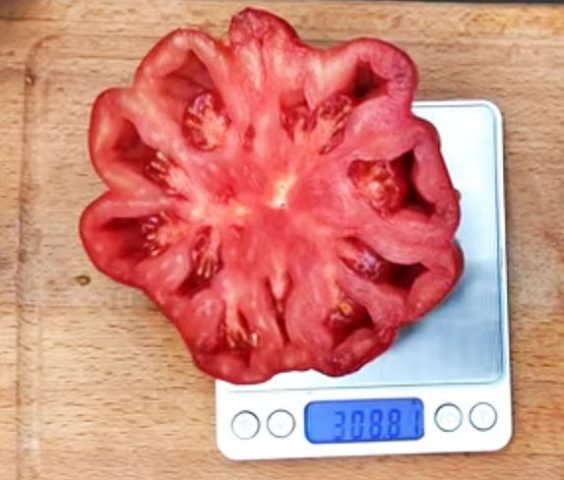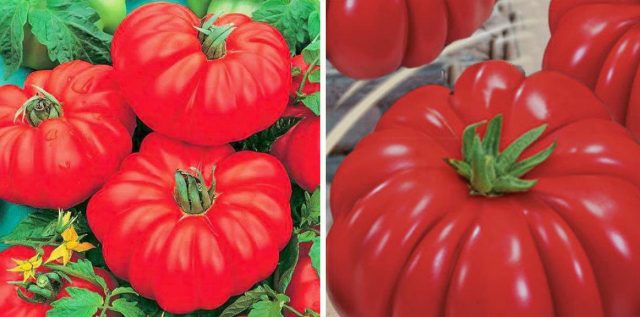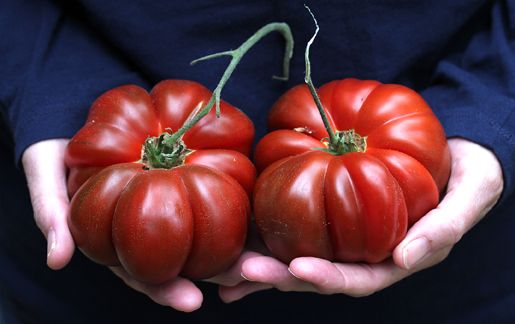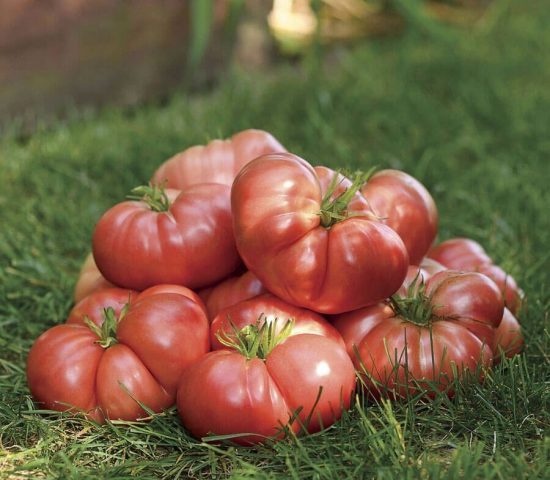Content
Among a wide variety of varieties, each gardener chooses a tomato according to his taste, ripening time and nuances of agricultural technology. The Nina tomato is very popular as a salad variety for fresh consumption. Its unusual shape attracts connoisseurs of rare varieties.
Description of tomato variety Nina
It is a semi-determinate variety with high yields. Tall, in Central Russia it is grown in greenhouses, in the south - in the open field. The Nina tomato bush can reach a height of 1.8 m. That is why experts advise to pinch it and tie it to a support. It is not bad to form a plant into 2 stems.
The first inflorescences are formed above the ninth leaf, and all subsequent ones - every 3 leaves. Complex and semi-complex brushes. According to the description, as well as in the photo and according to reviews, Nina tomatoes are a very unusual plant with a rare appearance of fruits.
Description of fruits
The fruits of the Nina variety have an unusual ribbed shape. When cut, such a tomato looks appetizing on a plate, as in a salad. The relief is pronounced, the tomato itself is flat-round in shape. The color of the ripe tomato is bright red, and the core is crimson. The fruits are large - weight from 350 g. Some tomatoes of this variety reach 700 g. The taste qualities of Nina tomato are at a high level. Ripe fruits are sweet with a slight sourness. The variety belongs to salad, looks beautiful when sliced, has voids.
The main characteristics of the tomato variety Nina
The yield is average. You can get about 20 kg of tomato from one square meter. From the moment of germination to the collection of the first tomatoes, it takes about 100 days. It is necessary to start planting seedlings 60 days before disembarking in open ground.
Planting density is recommended at 4 plants per square meter. Subject to all the rules of planting and leaving one plant, you can collect up to 5.5 kg of ripe tomatoes.
To get the maximum yield, the plant must be pinned, properly formed, as well as fed and adhered to the basic rules of agricultural technology.
Variety Nina is resistant to top rot, weakly exposed to tobacco mosaic, and is also not prone to Alternaria.
Pros and cons of the variety
The advantages of the Nina tomato variety include:
- high productivity;
- fruits of large size and unusual shape;
- resistance to most known tomato diseases;
- the ability to endure cold weather without harming the crop;
- suitable for both greenhouse and open ground.
But this variety has its drawbacks:
- high growth;
- the need to shape and tie up the plant.
As a result, the variety has many fans, since the advantages of Nina tomatoes are much greater than the disadvantages. The plant does not differ in demanding care and planting, agricultural technology does not differ from most varieties of tomato.
Features of planting and care
Like every variety, Nina tomato requires compliance with some care and planting features. This applies not only to the choice of terms that are important for any variety, but also to the quantity and quality of top dressing, soil moisture, and the nutrient composition of the soil. Proper care starts from the moment you select seeds and grow seedlings, to harvest. The Nina variety is high-yielding, if you provide proper care for it, 5-6 kg per bush is a very real harvest.For the Nina variety, the basic factor of yield is the garter and pinching. It is also important to observe the timing of planting seeds for seedlings and the timing of planting seedlings in open ground.
Growing seedlings
The first thing you need to decide on when planting tomatoes is the time for sowing seeds for seedlings. For the Nina variety, the best option is mid-March.
You can sow both dry seeds and pre-soaked seeds. There is practically no difference in germination. Experts recommend insisting the seeds in a nutrient solution before planting. In an urban setting, it can be a specialty drug from a store. But the best option is an ash solution. It will take 2 tablespoons of ash to dissolve in a liter of hot water, then insist for two days.
Sowing seeds is necessary in small containers. The best option is food plastic cups. The soil can be purchased ready-made in a specialized store, as well as made by yourself. To do this, you need to take some humus and sand.
To increase moisture permeability, chopped sphagnum can be added to the soil.
There is also a second option for a seedling nutrient mixture: mix sand and sawdust in a 1: 2 ratio. It is better to impregnate sawdust with mineral fertilizers for greater soil nutrition.
It is better to germinate the seeds before sowing. To do this, lay them out on a damp cloth. Good quality seeds should germinate in 3-4 days.
The germination container must have drainage holes. If plastic cups are used as containers, then 3 holes for drainage are made in their bottom.
Algorithm for planting prepared seeds:
- Fill the planting container with drainage such as pebbles or eggshells.
- Pour the prepared soil into a glass and pour over with warm water.
- Tomato seeds are sown no deeper than 2 cm.
- Cover the cups with foil and place them in a warm room with a temperature of up to 28 ° C.
- Wait for shoots for 5-7 days.
- Expose the container with seedlings to the light.
After that, the care of tomato seedlings is important. The lighting should be increased and the temperature can be lowered. So Nina's tomato seedlings are kept for a week. Then it is again transferred to a warm room with a temperature not lower than + 22 ° C. There is no need to water the seedlings abundantly before picking.
The picking of Nina tomatoes occurs 10-14 days after the first shoots appear. Algorithm for picking:
- The seedlings should be watered in 2 hours.
- Gently remove the tomato using wood chips.
- Pinch the central root.
- Place the seedlings in the groove in the soil to the bottom leaves, spread the roots, sprinkle with earth.
- Tamp and place in a dark place for 2 weeks.
Watering the seedlings after picking until they take root, you need 1-2 times a week.
Two weeks before transplanting seedlings into open ground or into a greenhouse, hardening must be done. First, the tomatoes are taken out into the street for 10-15 minutes, every day the time the tomato is in the fresh air is increased to 1.5 hours.
Transplanting seedlings into open ground
Transplanting a tomato of the Nina variety into open ground is carried out in the second decade of May. For greenhouse cultivation - end of April. The optimal distance between plants is half a meter. The row spacing is 40 cm. For 1 sq. m it is enough to plant 4 plants.
If there is a threat of recurrent frosts, it is recommended to cover the tomato root system with a film at night.
Care rules
Tomato variety Nina belongs to the moisture-loving varieties. Therefore, it is better to organize drip irrigation, which will prevent excessive moisture and provide enough moisture for each plant. Also, a drip policy protects against late blight on tomato.
After watering, it is recommended to loosen the soil in the root zone.
As a top dressing, mineral fertilizers can be applied 2-3 times per season.If desired, they can be replaced with a boric acid solution, infusion of green grass or cow dung. All fertilizers are best applied in liquid form so that the root system can absorb them to the maximum.
Grassing tomato Nina increases the fruiting period. Docking should be done in the morning with good lighting and ventilation. It is recommended to remove stepchildren every 7-10 days. Passynching is carried out without the use of tools, by hand. It is necessary to pinch the shoot and leave a stump of 3 cm.
It is recommended to form a tomato Nina as a semi-determinate in 2 stems. This means that one sturdy stepson should be left right under the first blooming brush.
The Nina variety assumes a mandatory garter, since the fruits are heavy, and the bush is medium-sized.
Conclusion
Tomato Nina is suitable for growing both in greenhouse conditions and in the open field. The main positive characteristics of this variety of tomatoes are its high yield, large and beautiful fruits, which will be the pride of the hostess in a festive cut. Tomato Nina in the description of the variety and in the photo appears to be an almost exotic variety that will be the pride of any gardener. Disease resistance will allow you to get a high yield with minimal observance of the rules of tomato agricultural technology.
Testimonials












